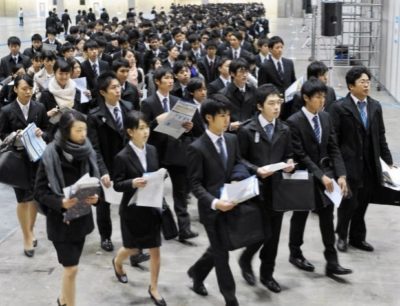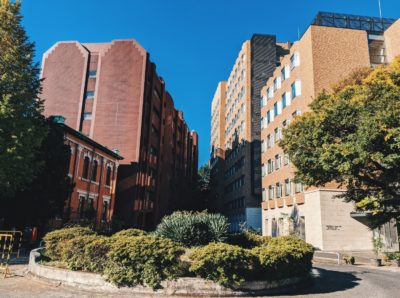As tour guides, we often get questions about the Japanese education system and the life of working people like company employees in Japan. Many people who travel to Japan are familiar with anime or manga about high school life or the stories about Japanese employees living solely for the company they work for. Our customers want to know what is true of the stories they have read or heard. Wath is school life in Japan really like for high school and university students?

Preparing the Future Generation
It is true that every country has its own unique school system to prepare kids for life as an adult and the job market, and Japan is no different. The way a country educates its future generations says a lot about the culture and the way of life. The way school life in Japan looks says a lot about Japanese culture, and what kind of traits Japanese people value. What does the educational system in Japan look like in high school, university, and beyond? For more information on the educational system in Japan for kids between 0-15, you can read this article.
High School Life in Japan
High school life is not that different from junior high school. So studying the 3 core subjects, doing homework, and participating in bukatsu (clubs) still take center stage. Most of your classmates will be new faces though, as kids spread out all over the city after junior high school. This happens based on the (private) school they got accepted into.
The focus will also shift more and more towards hard exam prep, which is not only done in school but also in juku (cram school). Around 60% of Japanese highschoolers attend juku, which more often than not swallows all their free time. Juku in high school often means studying how to take tests. And it doesn’t necessarily involve studying subjects in such a way that you can use your skills in daily life.
University Entrance Exams
And then it is time for the big one, the university entrance exam. This is actually not that different from the high school entrance exams. Because kids usually choose a few different universities to try the exam for. There are also private and public (hard to get into) universities. The pressure and the stakes are high. And more often than not, the last year of high school is one of the most stressful periods in a Japanese person’s life.
Many will wonder what happens to those who fail all of their university entrance exams. Or, the only exam that they took. Is all hope lost for them? Thankfully, it isn’t. Many of those who fail to get into the school of their choice will do a so-called ‘ronin year’. Ronin means ‘master-less samurai‘, so you can probably imagine why it was named this way.
These students will take a year off to study in juku or with private tutors and try for the exam once again one year later. You are allowed to take the exam multiple times over multiple years. It is not recommended to try more than once or twice, however. Because prospective employers who have their choice from the best will find one or more ronin years a red flag on someone’s CV.
University or Vocational School Life in Japan
There are two main directions to choose from after finishing high school if you want to stay in school. Going for any of the special routes like med school or aviation school is also different. But otherwise, you either go to a 4-year college/university for a Bachelor’s Degree. Or you go to a vocational school that usually lasts between 2-4 years.
Vocational school is called senmongakkou (mostly general) or kosen (technical) in Japan. These schools educate students in a specific profession. Examples are hairdresser, carpenter, car mechanic, or web designer. Many technical professions require prospective workers to go to senmongakkou or kosen. Students who choose to go to senmongakkou have a very strong idea of what they want to do. They also often have an aptitude for the direction they choose.
When students are in senmongakkou, they already train real-life practical job skills. So when they are done with school they are useful employees right away. Then there are also junior colleges (tanki daigaku, or shortened college) that are mainly attended by women. Students at regular junior colleges usually end up working in healthcare or in elderly or pre-school care jobs. Polytechnical junior colleges on the other hand train students to become mid-level technicians. They have great prospects in the labor market.
Types of Universities
4-year universities are called daigaku in Japan. This is the most common type of tertiary education to attend in Japan. People who enter these universities mostly hope for a career as white-collar workers in a large company. Again, there are private and public universities. And public universities are the most sought after universities to enter. As spots are limited, you have to pass a difficult entrance exam in order to be admitted.
For those who can’t make it to a public university, there are always private universities. They are a lot more expensive. There are better private universities and not-so-great private universities, depending on what your parents can afford. Student loans are still quite rare in Japan. So, parents are expected to foot the bill for their kids’ education and living expenses until college is finished.
Job Hunting
One of the most interesting things about daigaku is that students generally don’t (have to) work very hard to pass exams. It is seen as a time to relax after the crazy ‘entrance exam hell’ of high school. The start of adult responsibilities and working long hours in a company will come after. Professors are not too harsh on students, and in their 3rd and 4th year, they are given ample time off school. This way, they are able to participate in shukatsu, or job hunting activities.
If you don’t get any job offers in your 3rd year it is already getting stressful. But once you don’t get any offers in your 4th year it is time to get nervous. Not getting any job offers while still in university is seen as a red flag. Because this likely means that you have tried and failed to impress multiple recruiters. You can again take a ronin year and stay in university for one extra year. But this will obviously not look good on a CV, meaning you have to work extra hard to be recruited.
Entering the Labor Market in Japan
And then… once you enter a (large) company aged 22 you are seen as a tabula rasa with great potential. The company will completely mold you into the kind of employee they need. You will mainly learn company-specific skills and often rotate between departments. This happens until you end up somewhere where they want to keep you.
The department you will start at often has nothing to do with what your major was in daigaku, and neither might the department you will end up with. It is also common to work a lot of overtime in Japan, and socializing with your co-workers and bosses over drinks after work is still expected in quite a few companies.
Avoiding ‘Salaryman Life’
Of course, this is not everyone’s experience. Many younger Japanese people don’t want to work the way their fathers did and they choose to go a different path. One way to avoid the typical ‘salaryman life’ (or ‘office lady life’) is to work at a young startup company. In that type of company the first team members often get many kinds of responsibilities and work closely with the whole company as it is usually still small.
It is still risky, as startups are a lot more likely to go bankrupt than a large, established company and there is no established company culture yet but some people find it very rewarding to work for a startup. Another way to avoid the average salaryman’s life is to work for a foreign company that has a more international and diverse company culture. Of course, you will usually have to speak business-level English at least which is still rare in Japan. And finally, you can start up your own company or work as a freelancer, but this is usually only interesting for those who gained some work experience first.
After School Life in Japan : Job Mobility
Job mobility used to be very rare in Japan, in fact, staying at the same company from graduation until retirement used to be the holy grail. When the Japanese economy crashed in the early 90s and never quite recovered from that, things gradually started to change. A significant part of the generations that graduated in the 90s and 00s had a very hard time finding a full-time job, and that toll is still visible today as many of the group that didn’t find employment within a few years are still unemployed or underemployed.
After 2010, this trend reversed again because the graduating generations are getting smaller every year because of the declining birth rate in Japan. Before the COVID-19 crisis hit, university students had it good and most people could choose between multiple job offers as the market was in their favor. People also started switching jobs more often, as certain talent is in such high demand that they can get ever higher salaries with each job switch.
At this moment things became difficult again because many companies want to hire fewer people or even none at all for an April 2021 start for the obvious reasons, but it is to be expected that once the crisis resolves, fresh grads will once more be in demand because of the generally tight labor market. Once the situation gets better again, it is likely that the job market will keep evolving to resemble the much freer markets of the US or Europe more closely including more job mobility and a better work-life balance.
Your Japan Tour
As seasoned Japan experts, we can help you create your perfect Japan tour including local tour guides that can tell you all about daily life in Japan and things like education and work in Japan. Contact us to start planning your unforgettable holiday to this fascinating country. Japan is full of once-in-a-lifetime experiences, culture, history, nature, and delicious food!
